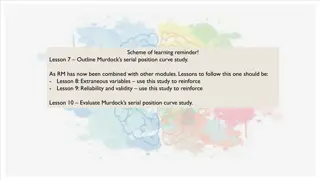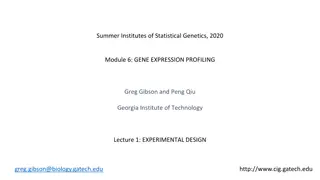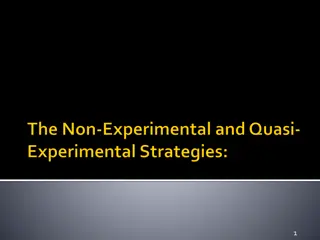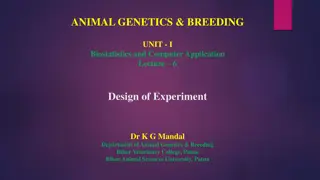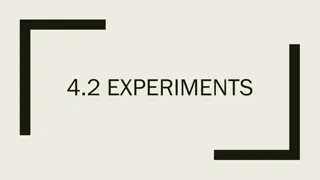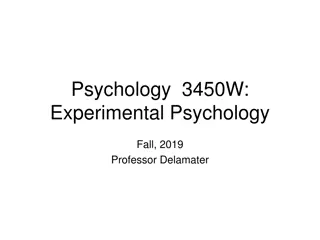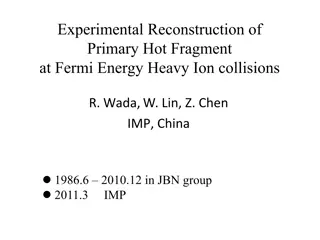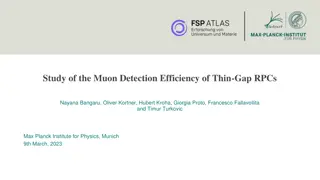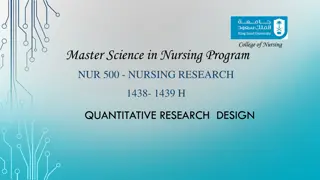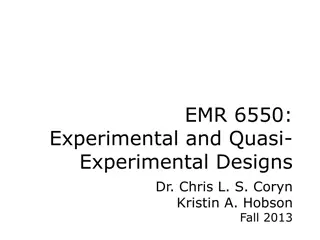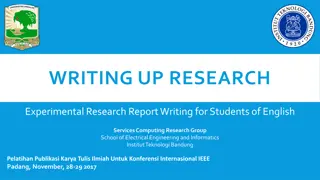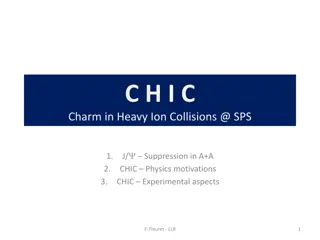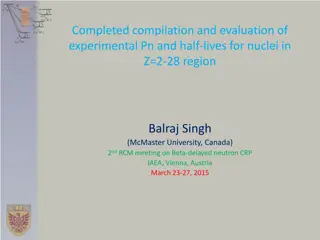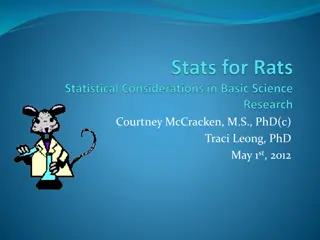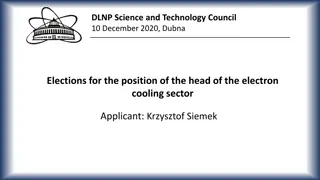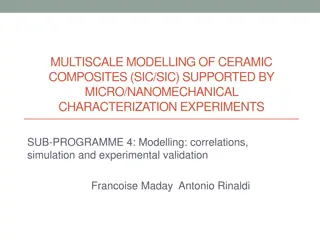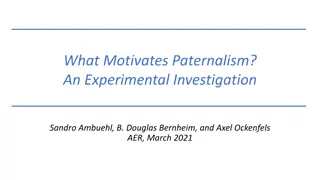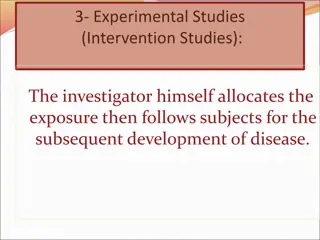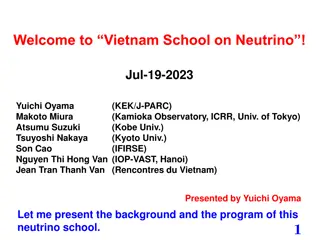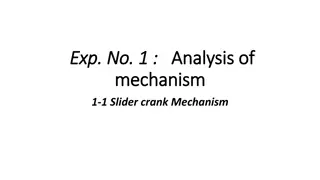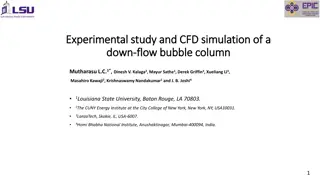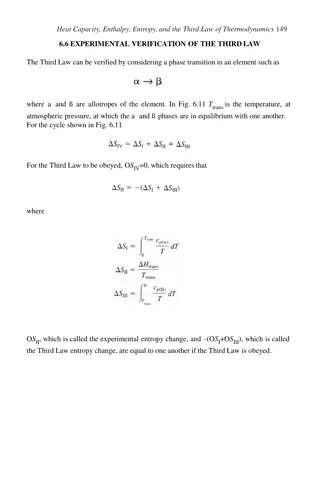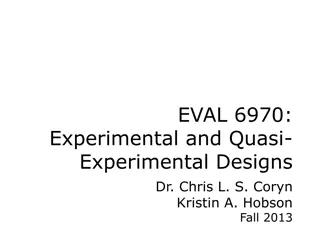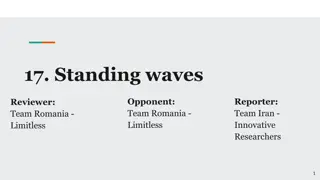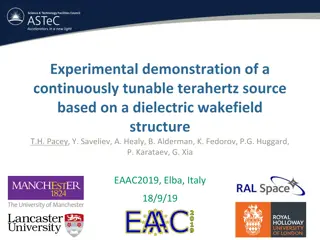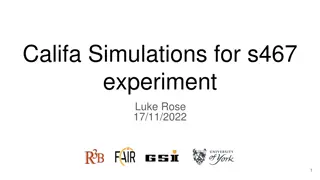Introduction to Experimental Economics by John Hey: A Comprehensive Overview
Explore the interconnected realms of Experimental Economics and Behavioral Economics through the insightful lectures of John Hey, an Emeritus Professor at the University of York. Discover the methodology of testing economic theories for validity and the practical applications of experimental economi
1 views • 58 slides
Insights on Experimental ASF Vaccines in Pig Studies
The research conducted by Prof. Jishu Shi and his team at Kansas State University delves into the safety and efficacy testing of experimental African Swine Fever (ASF) vaccines using pigs as the model. Various vaccines, including DNA vaccines and live attenuated viruses, were tested against differen
4 views • 13 slides
Learning Reminder: Murdock's Serial Position Curve Study and Experimental Practice
Explore the insights of Murdock's serial position curve study and its applications in experimental psychology. Dive into the concepts of alternate and null hypothesis, Sensory Register, and memory experiments. Engage in practical learning through experiment time activities and visual aids like patch
0 views • 76 slides
Gene Expression Profiling in Statistical Genetics Summer Institute 2020
This content provides information on the Summer Institutes of Statistical Genetics module, focusing on gene expression profiling. It includes details on the schedule, experimental design, RNA sequencing workflow, modes of bulk RNA sequencing, and RNASeq software. The content discusses crucial steps
0 views • 11 slides
Understanding Nonexperimental and Quasi-experimental Studies
Nonexperimental and quasi-experimental studies resemble experiments but lack random assignment, making them valuable for group comparisons without establishing causation. This type of research design looks at differences between groups that already exist, focusing on group differences rather than ca
1 views • 35 slides
Design of Experiment in Animal Genetics & Breeding: Principles and Methods
Biostatistics and computer applications play a key role in the design of experiments in animal genetics and breeding. Proper allotment of treatments to experimental units is crucial to study treatment effects accurately. Designing experiments helps in maximizing information from available resources,
0 views • 37 slides
Understanding Experiments in Research: Observation vs. Experimentation
Observation and experiments are two crucial methods in research. An observational study involves observing and measuring variables without influencing responses, while an experiment deliberately applies treatments to measure responses. Confounding variables can affect the results, and factors like e
0 views • 13 slides
Understanding Experimental Psychology: Designs and Control Issues in Research
This content delves into the basics of experimental research, focusing on different types of experimental designs and control issues. It covers between-group and within-group designs, discussing advantages and disadvantages, as well as methods for controlling for nonequivalence. The importance of ra
0 views • 26 slides
Understanding Probability: Experimental and Theoretical Concepts
Probability is the measure of the likelihood of an event happening, with experimental and theoretical probability being key concepts. Experimental probability involves determining probabilities through experience or experiments, while theoretical probability can be calculated without prior experienc
2 views • 23 slides
Experimental Reconstruction of Primary Hot Fragment in Heavy Ion Collisions
Investigation into primary hot fragment reconstruction at Fermi energy heavy ion collisions, utilizing experimental data and simulations to reconstruct excitation energy, mass, and charge of primary fragments. Techniques like kinematical focusing and isotope identification were employed, with a focu
0 views • 36 slides
Study of Muon Detection Efficiency in Thin-Gap RPCs
Conducted at the Max Planck Institute for Physics in Munich, this study focuses on the detection efficiency of thin-gap Resistive Plate Chambers. The research explores the construction, working principles, and experimental setup of RPCs, emphasizing the need for sensitive frontend electronics for hi
0 views • 14 slides
Investigating Immiscible Fluids: Layers Formation and Interface Motion
The report explores the formation of layers in a beaker containing immiscible fluids such as water and vegetable oil. It delves into the theoretical and experimental aspects, discussing the chemical properties, layer creation limits, interface motion upon disturbance, and the strengths and weaknesse
2 views • 6 slides
Sequential Search with Offer Freezing: Theory and Experimental Evidence
This paper explores the concept of offer freezing in sequential search scenarios, particularly in the context of airline ticket pricing. A theoretical model is constructed to analyze the implications of price freezing options, followed by an experimental evaluation of the model's predictions. The st
1 views • 49 slides
Impact of Dissolved Oxygen and Flow Rate on Watercress Germination and Growth
A study by Claire Cleveland and Dr. Laurie Mauger explores the effects of dissolved oxygen concentration and flow rate on watercress germination and growth. The research includes ecological markers, existing evidence, hypothesis, experimental design, and anecdotal results indicating that watercress
0 views • 15 slides
Experimental Investigation of Risk Perception in Wine Purchases
The American Association of Wine Economists' 10th Annual Conference delved into consumer behavior and perceived risk when buying wine. The study explored risk, uncertainty, ambiguity, and conflict in wine purchases, presenting preliminary findings on risk-taking behaviors. An experimental investigat
0 views • 26 slides
Quiz Review on Scientific Method and Graphing
Explore a quiz review covering topics related to scientific method, graphing, and experimental design. Understand key concepts such as hypothesis, scientific law, theory, variables, and experimental control through detailed questions and images. Test your knowledge on laboratory safety, inferences,
0 views • 14 slides
Understanding Quantitative Research Designs in Nursing
Delve into the world of quantitative research in nursing, exploring different research designs and the concept of causality. Learn about experimental, quasi-experimental, and non-experimental designs, as well as the characteristics of experimental design like manipulation, control, and randomization
0 views • 22 slides
Quasi-Experimental and Interrupted Time-Series Designs Overview
Explore the various quasi-experimental designs, control groups, pretests, and outcome patterns in research methodologies. Understand the implications of different outcome patterns on causal interpretation and validity threats in experimental studies.
0 views • 31 slides
Writing Up Research: Experimental Research Report Writing for Students
This report covers the essential sections of an experimental research report writing, including the abstract, introduction, method, results, and discussion. It emphasizes the importance of each section in conveying the study findings effectively to readers. The introduction is broken down into five
0 views • 54 slides
Charm in Heavy Ion Collisions: Experimental Comparisons from SPS to LHC
Investigating charm suppression in heavy ion collisions at different energy levels, this study compares experimental data from SPS to LHC. Analysis suggests similar suppression at SPS and RHIC, with potential factors like recombination and direct J/ψ production influencing results. Uncertainties re
0 views • 16 slides
Understanding Experimental Design in Biology
Explore key concepts in experimental design in biology through clicker questions focusing on hypotheses, variables, control groups, and experimental groups. Learn how scientists test hypotheses and analyze results to draw valid conclusions in biological studies.
0 views • 15 slides
Compilation and Evaluation of Experimental Data for Nuclei in Z=2-28 Region
Completed compilation and evaluation of experimental Pn and half-lives for nuclei in the Z=2-28 region, led by Balraj Singh at McMaster University. The work involved preparing lists of neutron-rich nuclides, identifying potential emitters, analyzing available experimental data for 1n, 2n, 3n, and 4n
0 views • 20 slides
Biostatistics Core Principles in Experimental Design for Research Studies
Gain insights into the core principles of biostatistics for research studies, including experimental design, sample size considerations, and involving a biostatistician. Learn to formulate clear research questions, determine treatment groups, and address potential sources of variability in your stud
0 views • 52 slides
Advances in Positron Annihilation Spectroscopy and Experimental Research at DLNP Science and Technology Council Dubna
Positron annihilation spectroscopy (PAS) is a powerful technique used to study material structure and defects. DLNP Science and Technology Council in Dubna has been focusing on developing experimental techniques with slow monochromatic positron beams, leading to advancements in defect characterizati
0 views • 6 slides
Advances in Ceramic Composite Property Modeling and Experimental Characterization
European research focuses on advanced modeling of C/C, C/SiC, and SiC/SiC composites for aerospace and nuclear applications, with an emphasis on correlating simulations with experimental validation. Laboratories are progressing towards a multiscale approach, integrating micro/nanomechanical characte
0 views • 5 slides
What Motivates Paternalism? An Experimental Investigation
Centuries of normative debate on paternalism have resulted in its ubiquity in various aspects of society, from consumer protection to safety regulations. However, there is a scarcity of empirical studies on the motivations behind paternalistic interventions. This experimental investigation delves in
0 views • 12 slides
Understanding Experimental Studies: Intervention, Characteristics, and Measurements
Experimental studies involve the investigator assigning exposures and following subjects to observe disease development. Different types of experimental studies exist, such as preventive and therapeutic types, each with its limitations, including ethical concerns and challenges in recruiting subject
0 views • 13 slides
Understanding Experiments and Threats to Validity
Explore the world of experimental research, internal and external validity, threats to validity, and the importance of proper study design in ensuring the credibility of research results. Learn about confounding variables, threats to internal validity such as environmental factors and group comparis
0 views • 15 slides
Understanding Research Methods and Data Analysis
This review covers topics such as experimental classification, the comparison of non-experimental and experimental research, software features like JMP and SPSS, outlier handling in data analysis, and levels of measurement in statistical analysis.
0 views • 13 slides
Vietnam Neutrino School Overview
Vietnam School on Neutrino is an annual event started in 2017 to promote experimental neutrino physics in Vietnam. Led by Prof. Jean Tran Thanh Van, the school focuses on lectures, software and hardware training, group works, and excursions. With a mix of students from various countries, the aim is
0 views • 7 slides
Analysis of Slider-Crank Mechanism and Experimental Data
Slider-crank mechanism analysis involves understanding the transformation of input motion into desired output motion. This mechanism consists of a crank, coupler, slider, and ground link, converting circular motion into linear motion. Experimental procedures involve setting crank angles and recordin
0 views • 6 slides
Experimental Study and CFD Simulation of a Down-flow Bubble Column
This study and simulation focus on the experimental setup, measurement techniques, and results of a down-flow bubble column. It explores novel features such as inverted bubbly flow, micro-bubble generation, and gas injection. Detailed analysis includes axial and radial variations of volumetric gas h
0 views • 25 slides
Thermodynamics of Materials: Experimental Verification and Entropy Analysis
Verification of the Third Law of Thermodynamics through the study of phase transitions in elements like sulfur, exemplifying the relationship between heat capacity, enthalpy, entropy, and the Third Law. Experimental data on entropy changes and molar entropies, as well as insights into the behavior o
0 views • 24 slides
Understanding Experimental and Quasi-Experimental Designs
Explore the foundations of experimental and quasi-experimental designs, delving into causal relationships, counterfactual reasoning, and the importance of validating statistical and internal conclusions. Learn about causes, effects, and the complexity of determining causation in research. Discover R
0 views • 46 slides
Understanding Probability: Learning Outcomes and Examples
This content delves into the study of probability, covering topics such as representing probabilities of simple and compound events, calculating relative frequencies, multi-step chance experiments, theoretical and experimental probabilities. It explains concepts like chance experiments, sample space
0 views • 31 slides
Evaluation of Experimental Study on Standing Waves Formation
The evaluation report discusses the strengths and weaknesses of a presentation on standing waves, covering aspects like theoretical understanding, experimental demonstration, and presentation quality. Both the reporter and opponent are critiqued for their approaches, with the opponent highlighting t
0 views • 5 slides
Experimental Demonstration of Continuously Tunable Terahertz Source in Dielectric Wakefield Structure
Studying radiation in a dielectric wakefield accelerator for continuous tunability of a terahertz source. The research explores Coherent Cherenkov radiation, varying structure gaps to control frequency and pulse energy. Experimental setup includes bespoke diagnostics and variation of CCR pulse energ
0 views • 15 slides
Understanding Experimental Studies in Epidemiology
Epidemiological studies and experimental studies play vital roles in understanding cause-and-effect relationships in research. Experimental studies involve manipulating independent variables and measuring dependent variables, with categories such as true experimental, quasi-experimental, and pre-exp
0 views • 22 slides
Califa Simulations and Experimental Observations in Nuclear Physics Research
Exploring nuclear physics research through Califa simulations and experimental observations with a focus on PID gating, clustering algorithms, beam settings, and Ca isotopes chain gating. The study involves simulating events on CH2 targets, analyzing clustering effects, and observing opening angles
0 views • 10 slides
FY25 LBS Lab OMEGA/OMEGA EP Proposed Campaign
Proposed campaign in FY25 by the LBS Lab to measure specific deliverables, compare results with experimental and theory PIs, collaborate with others, and assess technical issues such as target fabrication feasibility. The campaign involves motivation, relevant milestones, previous/simulated results,
0 views • 6 slides


